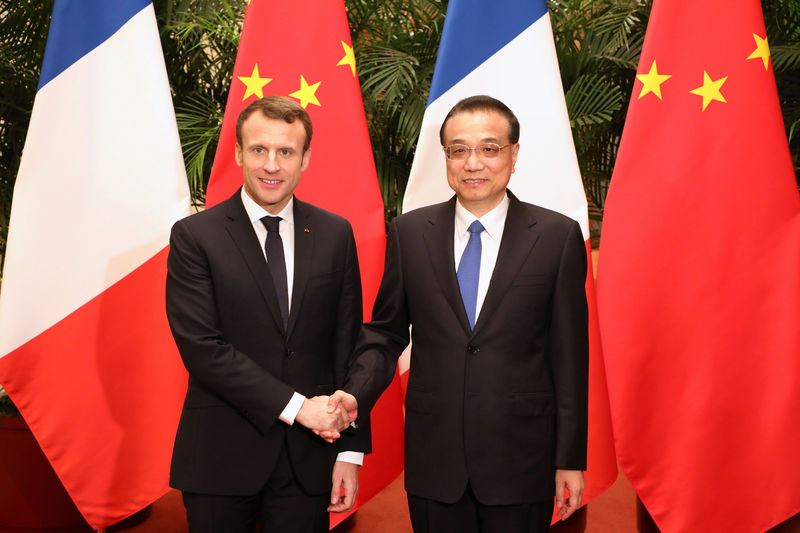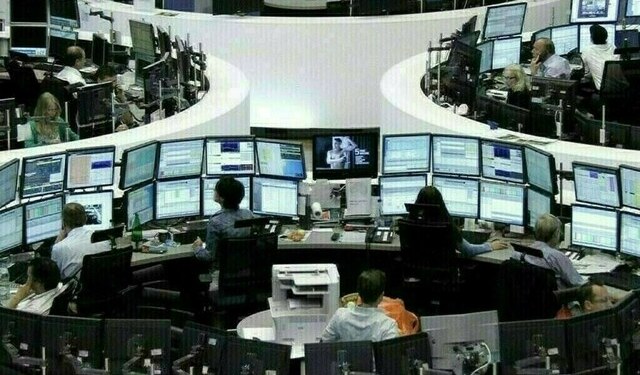 © Reuters. French President Emmanuel Macron shakes hands with Chinese Prime Minister Li Keqiang during their meeting in Beijing
© Reuters. French President Emmanuel Macron shakes hands with Chinese Prime Minister Li Keqiang during their meeting in BeijingBy Michel Rose
BEIJING (Reuters) – President Emmanuel Macron offered to open up France to Chinese investment in exchange for greater access to China’s booming markets on Tuesday, warning during talks in Beijing that existing trade imbalances would lead to protectionism.
On the second leg of a three-day state visit, the first of his eight-month-old presidency, Macron is hoping greater openness from China, coupled with lobbying from the 50-strong business delegation traveling with him, will help narrow the 30-billion-euro ($36 bln) trade deficit Paris runs with Beijing.
But despite bringing with him some of the heaviest hitters in French business, finance and industry — including senior executives from Airbus, BNP Paribas (PA:), AccorHotels, EDF (PA:) and LVMH — there were no immediate announcements of mega-deals. Instead, smaller contracts or commitments to go on talking were signed.
BNP Paris was set to announce plans for a joint-venture on consumer credit, an official said, and added that French nuclear group Areva had “never been so close” to signing a contract to build a reprocessing plant in China.
“We have an access to markets which is unbalanced, unsatisfying,” Macron told members of the French and Chinese business community at a start-up incubator in Beijing.
“If we don’t deal with this responsibly, the first, natural, reaction will be to close up on both sides.”
In his short time in office so far, 40-year-old Macron has managed to push through reforms to France’s labor market and seen a steady rise in business and consumer confidence. Growth forecasts for 2018 have been upgraded.
In the absence of either German and British leadership, with Chancellor Angela Merkel bogged down in coalition negotiations and Prime Minister Theresa May swamped by Brexit, Macron has emerged as arguably the strongest voice in Europe.
The trip to China is well-timed to convey that message and Macron has not been shy about promoting it, declaring after he arrived that “Europe is back” and announcing that he would visit China every year of his five-year presidency.
OPEN ON BOTH ENDS
But while the rhetoric has been strong, and TV commentary suggests Macron and his glamorous 64-year-old wife Brigitte have been a big hit with the Chinese, the underlying success of state visits is best measured these days in business contracts.
One of the most closely watched sectors is aerospace, with Airbus talks to sell 100 or more jetliners to China, officials familiar with the talks said last week.
Jack Ma, founder and executive chairman of online retailer Alibaba (NYSE:), gave Macron’s pitch for more openness his backing on Tuesday, but added both sides had a part to play.
“I think he’s right, China should open more, China is opening more,” he told reporters on the sidelines of a business forum at the Great Hall of the People in Beijing.
“France should open more, China should open more,” he added.
Macron, who met President Xi Jinping on Monday evening, said the two countries would fall into a lose-lose situation if continued restrictions on foreign firms in China prompted France and Europe to put a brake on Chinese investment in Europe.
“Let’s open up both instead,” said Macron, whose government has at the same time called for greater scrutiny of Chinese investment in Europe, particularly in sensitive sectors, concerned about protecting French interests and security.
Despite the relatively small number of deals announced so far, officials were confident of success.
“We’re confident we’ll achieve more than symbolic stuff,” a French official said, speaking on condition of anonymity. As well as aerospace, the agrifood sector is seen as key.
At the start-up incubator, French engineering firm Fives signed a deal with Chinese online retail giant JD.com, which will set up a logistics center in France to source French food and luxury products for sale online in China.
JD.com agreed to sell 2 billion euros worth of French products – such as Remy Martin cognac or Evian water – on its website over the next two years.
Source: Investing.com



























